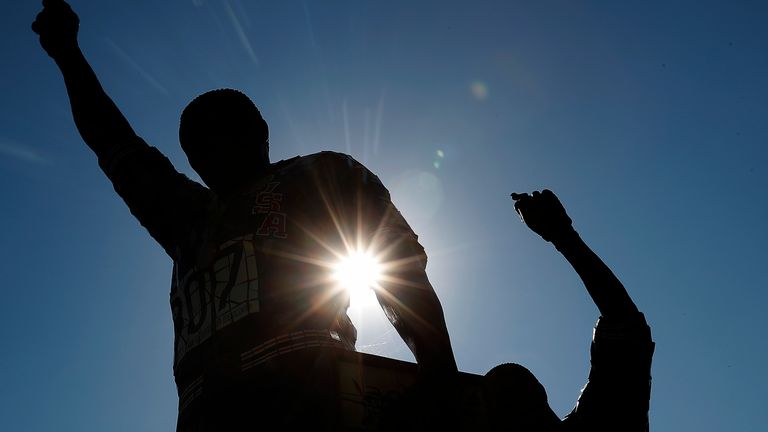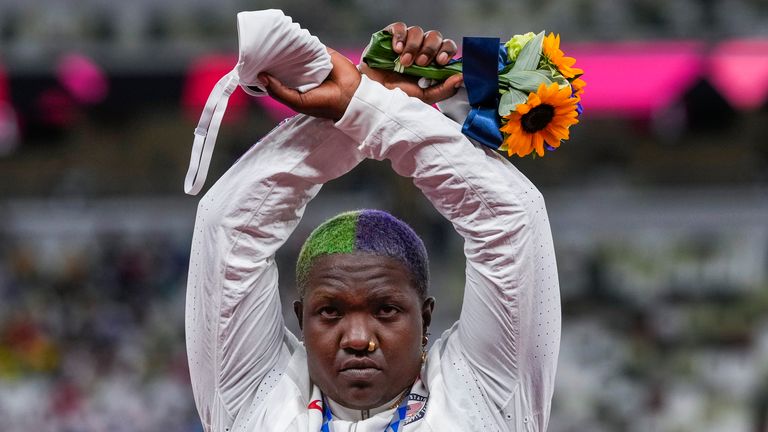Athletes will be free to protest on the podium and send respectful messages at this summer's Commonwealth Games in Birmingham, writes Geraint Hughes.
The Commonwealth Games Federation (CGF) is set to reveal that competitors who receive their medals will be able to "advocate" without fear of being stopped or sanctioned.
Sky Sports News can exclusively reveal that 'Athlete Advocacy Guidelines' have been drawn up in plans to demonstrate that the CGF will support any athlete who wants to positively highlight or draw attention to an issue that they feel is important, especially those around race, gender, sexual orientation and social injustice.
To make the podium a place where athletes can be free to address or highlight an issue contrasts with the experience many athletes have had at the recent Olympic Games in Beijing and Tokyo.
Despite relaxing its rules on protesting, the International Olympic Committee (IOC) states that the podium must not be used as place to raise awareness for a cause. Only a handful of athletes defied the decree in Tokyo, the most high profile being USA shot-putter Raven Saunders, who raised and crossed her arms after collecting her silver medal.
Brendan Williams, chair of the CGF's athletes commission, told Sky Sports News: "It's going to be fresh, something new, something changing and in most instances eye-opening, where the Commonwealth Games Federation is taking a bold step to allow its athletes to be those ambassadors of change.
"The podium at any games is a sacred space, it is basically the recognition and the awarding of all your achievements. You've done all the sweat, the sacrifices you have made to accomplish winning an event.
"But we at the Commonwealth Games are allowing athletes to use this platform. Advocate positively for social causes which they feel are just to them. But these athletes must also respect their fellow competitors because they too have placed enough work, sweat and sacrifices just to reach that point.
"Thus, we are advocating that athletes speak with their fellow competitor, speak for a cause that you feel so rightly that you should advocate for at the Games on the podium, so that you are on a level playing field whilst respecting each other.
"It may be human rights. It may be victimisation due to race. It may be the lack of understanding of my religious belief or my sexual orientation. So it is bringing awareness in a positive and respectful way."
Fierce debate
Ever since the killing of George Floyd in the US in 2020, male and female athletes have tried to use their platform in the public eye to raise awareness of issues around racial inequality, such as footballers 'taking a knee' before kick-off.
However, debate has often been fierce about whether athletes should use the podium as a platform for protest.
The Olympic movement has grappled with this for some time. IOC Rule 50.2 allows athletes to protest peacefully, mainly away from the field of play. But the organisation has made it clear that the podium is sacred and no protest, however peaceful or well-meaning, should take place on it.
Many Olympic athletes expressed disappointment with this rule before the Tokyo Olympics last summer, while no athlete at the Winter Olympics in Beijing used the podium to peacefully protest.
Team GB skier Gus Kenworthy, an openly gay athlete and advocate of LGBTQ+ rights, told Sky Sports News from Beijing that he did not want to risk jeopardising his chances of competing by falling foul not only of IOC rules, but also local laws within China.
Arguably the most famous protest witnessed on a podium came at the 1968 Olympics in Mexico City where US sprinters Tommie Smith and John Carlos each wore a black glove and raised a fist skywards in what Smith would later call a "human rights salute" after winning gold and silver respectively in the men's 200m. Smith and Carlos both wished to highlight racial inequalities within the USA.
Although neither were stripped of their medals, they were both expelled from the Games. The IOC at the time said Smith and Carlos' actions were a "deliberate and violent breach of the fundamental principles of the Olympic spirit".
At Birmingham 2022, it is hoped the podium will become a space where athletes can peacefully and respectfully advocate for causes during the medal ceremony.
Williams said: "I don't want to dwell too much on the IOC, but it [the move to allow protest] stems from frustration of all athletes who are performing at the top level of any major games where they're restricted from being themselves, restricted from using their platform to advocate for social causes or social injustices.
"Because athletes feel that the only time they are beneficial to a Games is only at the Games as they have a four-year cycle where they are dormant. So it is the best platform to utilise the podium, the field of play to advocate for such causes. So the CGF or Commonwealth Sport is utilising this frustration to allow all athletes to be truly central because they are the key stakeholders of any Games."
Positive protest not hate
Athletes are at the heart of the CGF's decision. But with it comes a responsibility for them to police what is said and done respectfully. Like all guidelines, some could challenge them and cross a line into uncomfortable territory.
Williams explains: "With or without the policy, athletes will still take a stance which may be deemed subjective. So am I worried? No. The reason being is that we are becoming a sport where I trust in all athletes to be mature enough to make decisions which will not only affect them, their country, their families or the sporting organisation in general."
The Commonwealth Games in Birmingham begin on July 28 and will conclude on August 8.

